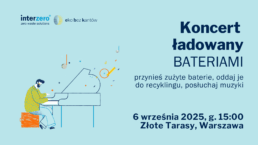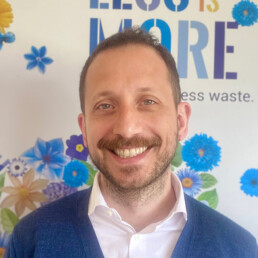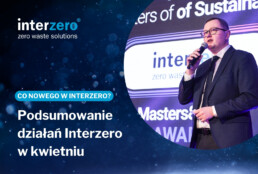EPR services in Poland at your fingertips - discover our new EPR platform!
Transfer EPR obligations in Poland: fast, convenient and in 100% online
Our new EPR platform is a nod to foreign entrepreneurswho want to conscientiously fulfil their EPR obligations in Poland. According to the law in force, they mostly cannot do this on their own - must conclude an agreement with the local representativewho will take on EPR responsibilities. Thanks to its extensive experience in the areas of environmental consulting and recycling, Interzero can comprehensively support such entrepreneurs with EPR service packages tailored to their needs and the specifics of their business.
The Interzero EPR platform is a one-of-a-kind digital contracting tool for EPR obligations in Poland. It makes our services even more accessible - you can order from 100% online and be assured that all your EPR duties in Poland are handled with the utmost care.
Using our EPR platform:
- you will learn about your responsibilities,
- calculate the cost of services,
- you will generate and sign a contract, entrusting us with all your company's EPR responsibilities.
For the convenience of our customers, we have automated and simplified the contracting process as much as possible. All you need to do is create an account for your company and enter the quantities or weights of the products and packaging you are entering in the spaces provided. We will take care of the rest. the system will automatically generate your contract and other documents. You will also receive a manual with instructions on how to sign and hand over all documents to us.
Using our EPR platform, you don't have to waste time sending requests for quotations and requests for individual quotes - you will immediately know the total cost and scope of your contract. You also won't have to print out documents or send them in hard copy - all formalities can be completed electronically.
The EPR platform is also a source of knowledge about the obligations arising from extended producer responsibility in Poland. You will find all essential information on the Polish EPR system and answers to the most common questions for the institution of an authorised representative for EPR in Poland.
All EPR services in Poland in one place
Every company needs slightly different EPR services and solutions in Poland. With the help of the EPR platform Interzero, you can easily select a range of services tailored to the specifics of your business. Whether you sell packaged products, electrical and electronic equipment, batteries and accumulators or empty packaging to Poland. we will take over all your EPR responsibilities, and in addition we will represent your company before the Polish authorities and bodies.
Our EPR services include:
- authorisation - If your company is not based in Poland, you can appoint Interzero as your authorised EPR representative.
- waste management - We will take care of the collection, recovery and recycling of waste from packaging and products introduced by your company. We will also ensure that the legally required levels of recycling, recovery and preparation for re-use are achieved,
- obtaining an EPR number (registration) - once an authorisation agreement has been concluded, you can legally use our EPR number. For companies that wish to have their own individual number, we offer the additional service of registration with the Polish BDO Entrepreneur Register.
Thanks to our EPR platform order all these services in one place and with only one contract!
How do you obtain an EPR number in Poland? From now on, it's easy!
Every foreign company that sells packaging and products covered by EPR regulations to Poland must include an individual EPR number on its sales documents. Through our platform, you will obtain it in a few simple steps!
- By appointing Interzero as authorised representative for EPR in Poland - order our Authorised Representative service and attach the signed documents to the portal. This will allow you to use our EPR number for all transactions with Polish customers.
- Choosing the BDO registration service (Polish EPR registry) - we will take care of registering your company and obtaining a Polish EPR number. After completing the official procedure, you will receive a confirmation of registration from us and you will be able to use your individual EPR number in Poland.
Go to the EPR platform and calculate the cost of your service >>
Attention: change of address of Interzero!

Dear Sirs,
we are pleased to announce that as of 19 August 2025 by resolution of the Board of Directors, the address of our company is changing. As of 25 August 2025. welcome to our new office located at the following address:
Al. Jerozolimskie 146D, 02-305 Warsaw
The decision to relocate is due to our dynamic growth and the need to provide our employees and clients with a more comfortable environment in which to work and collaborate. The new location offers better transport accessibility, modern infrastructure and more space, which will directly contribute to an even higher quality of our services.
The current figures for the companies are as follows:
| Company address: | Mailing address: |
|---|---|
| Interzero Advisory Spółka z o.o. 146D Jerozolimskie Avenue, 02-305 Warsaw |
Interzero Advisory Spółka z o.o. 178 Wólczańska Street, building A, 9 90-530 Łódź |
| Interzero Organizacja Odzysku Opakowań S.A. 146D Jerozolimskie Avenue, 02-305 Warsaw |
Interzero Organizacja Odzysku Opakowań S.A. 146D Jerozolimskie Avenue, 02-305 Warsaw |
| Interzero Polska Spółka z o. o. 146D Jerozolimskie Avenue, 02-305 Warsaw |
Interzero Polska Spółka z o.o. 65 Mogilska Street, 31-545 Kraków |
| Interzero Organisation for the Recovery of Packaging and Organisation for the Recovery of Electrical and Electronic Equipment S.A. 65 Mogilska Street, 31-545 Kraków |
Interzero Organizacja Odzysku Opakowań i Organizacja Odzysku Sprzętu Elektrycznego i Elektronicznego S.A (packaging recovery organisation and electrical and electronic equipment recovery organisation, respectively) 146D Jerozolimskie Avenue, 02-305 Warsaw |
At the same time, we would like to inform you that all other contact details, including telephone numbers and email addresses, will remain unchanged.
Please update our data in your records.
When we take care of the environment, do we also take care of ourselves? Recharge your batteries
The days 8 and 9 September - Wellbeing Day and Battery Recycling Day - are not coincidentally adjacent in the calendar. They share a common denominator: caring for the environment and for one's own health. Environmentally conscious actions, such as proper waste separation, translate directly into our wellbeing.
As part of this year's campaign, we invite you to a unique battery-powered concert. At the piano will sit Emilio Pianowho will play songs from his latest album as well as well-known hits. The concert will be an opportunity to collect used batteries - the more you bring, the more energy will power Emilio's performance!
We meet on 6 September (Saturday) in Zlote Tarasy in Warsaw.
Between plus and minus
The campaign was inspired by the results of a study conducted in 2024, published in the report Between plus and minus. One conclusion in particular caught our attention Contrary to popular belief, young adults under the age of 35 appeared to be the least engaged group in environmental activities. They are more likely than older generations to question the point of recycling and have less knowledge about the proper handling of batteries.
Take care of your batteries - take care of yourself
Batteries are an invention that has significantly influenced our everyday life. They allow us to use technology without the constraints of cables and sockets. Used batteries, if not disposed of properly, can seriously pollute the environment. They contain harmful chemicals such as heavy metals and toxic compounds that should be recovered through the recycling process. Disposing of them incorrectly is a real danger - to nature and to ourselves.
Therefore, responsible battery handling is not only about caring for the planet, but also about our health and quality of life.
Material from the first edition of the campaign can be found at EcoFree and in Interzero news.
"Charge your batteries" is part of Interzero's public education campaign "Eko bez kantów" introducing Poles to the topic of selective waste collection, recycling and circular economy issues.

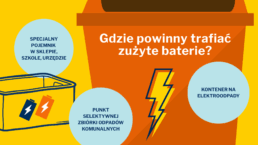
Environmental Debt Day? A little later - thanks to Interzero!
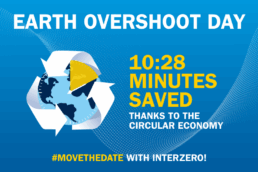
News
The Ecological Debt Day on 24 July 2025 marks the day when humanity has consumed more from nature than our planet can regenerate in a whole year. This year we will reach this day eight days earlier than last year. But it is not inevitable. Calculations Global Footprint Network, based on research resources SAVED carried out by Fraunhofer UMSICHT, show that the emphasis on a circular economy makes sense: together with customers and partners, Interzero is moving the Environmental Debt Day forward by more than 10 minutes - worldwide.
Although humanity has been living in ecological debt since the end of July, Interzero impressively demonstrates that a functioning closed-loop economy has a positive impact on resource conservation and climate protection. Every recycled pack, every reused electrical appliance and every properly collected battery reduces the demand for primary resources and is an important step towards our vision of a world without waste.
Mathis Wackernagel: "Over the past years, we have been refining our assessments of how Interzero's operations are reducing global environmental growth. Our latest calculations confirm that the company, together with its customers, has succeeded in moving Environmental Debt Day forward by several minutes. This means that Interzero is truly changing reality: the more it does, the smaller the global achievement of ecological debt."
Plastics as a key resource
Interzero sees plastics as a particularly important lever in postponing Environmental Debt Day. More than 50 per cent of the primary raw materials saved come from recycling of plastic packaging, especially lightweight packaging (LWP). However, the return and recycling of lightweight packaging not only has a large impact on volume within the Dual system, but the savings in this area are particularly high.
Improved and unified rules of the game
However, the potential is far from exhausted. In addition to consumer decisions by individuals or better waste separation, better structural framework conditions and the promotion of innovation are needed above all to pull the great lever that is the circular economy. There are a number of action points: expanding separate collection systems, introducing new extended producer responsibility (ROP) schemes at an early stage, consistently implementing sustainable public actions and prioritising recyclable packaging. A deposit system for batteries and accumulators can also contribute to improving safety across the industry. A clear policy framework is needed to promote technological innovation and guarantee investment in a circular economy.
Sybilla Merian: 'The ideas are here - strong, effective, forward-looking. Committed people, bold projects and innovative technologies are already making the circular economy a real game changer. But more is needed to anchor this change in the long term: we need to rewrite the rules of the game - boldly, collectively and with a future worth living in in mind.
Environmental Debt Day shows us that we are living beyond our means. But we can take action - with a team that is fully committed to making the circular economy work.
Let's #MoveTheDate. From Interzero.
Note on calculation methodology:
Global Footprint Network bases its calculations on a resource accounting tool called the Ecological Footprint. Using this data, the non-profit organisation compares humanity's or the population's current demand for resources with the Earth's capacity for biological regeneration. Most of the data for estimating Interzero's contribution to resource conservation comes from the study 'resources SAVED by Recycling' conducted by the Fraunhofer Institute for Environment, Safety and Energy Technology UMSICHT. Once a year, Interzero commissions these scientists to determine the amount of greenhouse gases and resources saved through our company's activities.
Summary of the Environmental Conference 2025
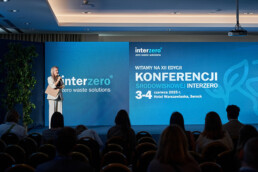
News
On 3-4 June 2025, the Interzero Environmental Conference took place - the most anticipated event in the recycling and environmental industry. The 12th edition of the Conference was packed with inspiring keynote speeches and substantive debates, where invited guests addressed legislative changes, the hottest environmental trends and the whole future of waste management.
19 speakers, 3 hot debates and 32 experts on stage at KŚ2025
This year's Interzero Environmental Conference took place at Warszawianka Hotel near Serock. The event was organised by Interzero, a leading provider of environmental services and circular solutions for companies of all sizes, and the Conference's partners were Bank Millennium and the Polish Chamber of Packaging Recovery and Recycling (PIOIRO).
As every year, the Interzero Environmental Conference brought together a distinguished line-up of guests - each day nearly 200 specialists participated in lectures and debates operating in the field of environmental protection, which provided a unique opportunity for networking and business development.
The two-day event will feature three panel discussions and 19 talks by environmental experts, eco-educators, business representatives and representatives of business organisations. The event was moderated by Kamila Kalińczak - radio and television journalist and creator of the educational game ĄĘ. The role of moderator of the discussion panels was played by Jakub Pawłowski, journalist and publicist, known, for example, for his series of videocasts "Eko Bez Kantów" carried out as one of the elements of Interzero's public education campaign of the same name.
GOZ direction - circularity in business the theme of most sessions
The lecture topics of the June Environmental Conference oscillated around one of the strongest social and business trends - the circular economy. Further lectures allowed participants to look at the issue of circularity from several key perspectives: legislative, industry and consumer.
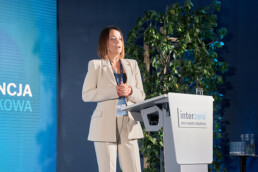
The EU and government's vision of GOZ was discussed by Paweł Sosnowski, Interzero's Board Representative for Environmental Regulation, who addressed the following in his speeches the subject of the new battery regulation and the controversial and widely reported ROP bill. Challenges of the packaging industry in the context of PPWR discussed by Konrad Nowakowski, President of the Polish Chamber of Packaging Recovery and Recycling. The buckle connecting all these areas was a speech by Interzero's Vice-President, Paweł Lesiak, who shed new light on the impact of this legislation on business and activities of Polish companies.
An extremely interesting consumer perspective was presented by Urszula Kozłowska, Communication Strategy Consultant and Marketing Educator, and Aga Wilke-Trochymiak, Senior UX Researcher from Allegro. Urszula Kozłowska demonstrated in an accessible and clear manner, how entrepreneurs can engage their customers into eco-actions and give them a real sense of empowerment. Aga Wilke-Trochymiak, meanwhile, talked about the packaging preferred by Allegro customers and discussed the Barriers discouraging consumers from changing their habits to be more eco-friendly. She also outlined the measures the company has implemented to respond to these preferences and dilemmas.
At the Environmental Conference 2025 there was also plenty of inspiration and insight from other business representatives - Among others, Tomasz Kurpiewski from McDonald's Polska, Marcin Jakubiak from Decathlon, Tomasz Patyra from Stora Enso and Ireneusz Janiczek from SodaStream talked about circular solutions used in their companies.
ROP, SUP and textile recycling through the critical eye of experts
The lectures delivered at the Interzero Environmental Conference were complemented by expert debates, during which invited guests discussed the most pressing problems and challenges of the environmental industry. On the first day of the event, a panel "Contemporary challenges in textile recycling: How can the industry effectively close the material cycle?". The debate was introduced by Agnieszka Oleksyn-Wajda from Lazarski University, who talked about how selective collection and producer responsibility can transform the textile industry.

Two debates are scheduled for the second day of the Conference:
- Sustainable packaging is both a gain for the environment and a challenge for businesses. How to reconcile ROP and PPWR?
- SUP in practice: How to reduce single-use plastics and not lose competitiveness?
The subject matter of the first panel discussion coincided with the moment when the draft law on ROP was introduced into the government's legislative work. On 2 June, the Council of Ministers announced that the project had been given the number UC100, and already on 4 June, experts Marta Szymborska of GS1 Polska, Paweł Lesiak of Interzero, Piotr Mazurek of Konfederacja Lewiatan, Dariusz Lizak of the National Economic Chamber of the Bottling Industry and Maciej Radzki of Bank Millennium debated the solutions proposed by the government on ROP and how to reconcile them with the provisions of the PPWR regulation. The experts gathered on stage agreed that the current draft of the ROP does not meet the expectations of businesses nor does it guarantee environmental benefits. Moreover, the protractedness of legislative procedures, the uncertainty of the law and the questionable quality of legislation are a brake on new investments and on building a competitive advantage for Polish companies.
In a similar vein was the second of the debates, during which experts discussed effects of the implementation of the SUP Directive in the Polish legal order. Jakub Zieliński from Orlen S.A., Ewelina Tokarska from Eko Myjnia Operator, Dr Daniel Kiewra from FOB, Jacek Kuś from Sfinks Polska S.A., Paula Dudek from Tedmark and Zbigniew Skowronek from Interzero discussed the possibilities of limiting single-use items without a drop in competitiveness. According to the experts, the Polish SUP has been a misfire - not only has it failed to motivate entrepreneurs or consumers to reduce plastic, it has also created room for abuse through its lack of precision and wide scope for interpretation.
Beyond the stage of the Environmental Conference 2025 - side events and attractions for participants
Events related to the Interzero 2025 Environmental Conference took place not only on stage, but also off stage. Attendees of the event were treated to booths from SodaStream, Millennium Bank, Interzero eco-devices, a colourist and the Interzero Environmental Education Team.
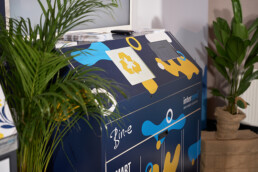
- SodaStream representatives presented carbonated water saturator system and talked about the brand's philosophy and its development in the spirit of GOZ and zero waste.
- Bank Millennium advisors presented to interested parties financing opportunities for green projects and investments.
- Conference participants were able to test modern bottle dispensers. The Bin-e smart self-sorting bin, the PEL solar compacting bin and the Oklin GG-02 electric composter were also available for testing in the eco-device zone.
- A professional colourist conducted colour analyses and identified the beauty types of the Conference participants to help them make informed and always accurate shopping choices.
- The Interzero Environmental Education Team presented original educational materials and set up a recording studio to create new episodes of the Eko bez kantów videocast.
Under the motto of GOZ and circularity, the 12th edition of the Interzero Environmental Conference is now history. In conclusion, the organiser invited all those present and absent in Serock to the next industry event under the KŚ banner, which will take place in 2026. Follow the latest Interzero events >>
What's new at Interzero? Check out the summary for May
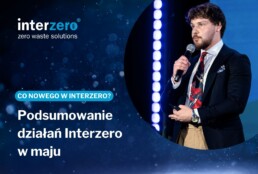
Supporting the green transformation of companies - May speeches by Interzero representatives
E-leasing Day
The e-Leasing Day conference is the most important event of the leasing industry in Poland, concerning the directions of development, digitalisation and the future in cooperation with the digital industry. There was no shortage of topics related to the green transformation of business - the agenda for the event included talks on topics such as the life of a post-lease car or the Leasing 2040 project, which assumes ecology as one of the three key areas of development for the industry.
Interzero was represented by Robert Kowal, Business Development Manager with a talk entitled "Automation, digitalisation and appropriate financing on the way to a circular economy. Case studies.", in which he analysed existing and prosperous circular economy models in the leasing model. He emphasised the importance of investing in innovation today:
- Many closed-loop projects directly do not pay off today; many companies do not want to invest in them. It is therefore worth looking further into the future and considering how much we can gain in a few years' time if we invest in the circular economy today.
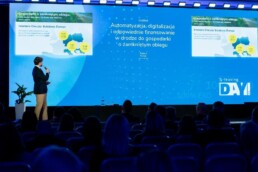
A green future for Polish companies - Interzero at the Sustainable Economy Summit
At the end of May, we had the pleasure to be part of one of the most important ESG events for entrepreneurs. The Sustainable Economy Summit aims to set new paths for growth - respecting our environment and taking into account business values. Participants included sustainability, ESG and CSR experts, entrepreneurs and senior executives responsible for implementing sustainable practices in their companies, as well as representatives from public administration and NGOs.
Paweł Lesiak, Vice President of the Management Board at Interzero, participated in a panel on the effective model of extended producer responsibility and the circular economy. He paid particular attention to the issue of ROP system solutions - based on both financial and organisational responsibility. He expressed the expectation that the ROP model for packaging, which will eventually be developed in cooperation with all parties involved in the system, will guarantee a real field of cooperation between producers, local governments and recyclers - so as to ensure an effective waste management system and bring about a full closure of the raw material cycle.
- More than 40 non-governmental institutions disagree and are protesting against the ministry's proposed changes. We have been working on the ROP as Interzero since 2018. We held meetings with both producers and local government. We agree that the costs to date have been underestimated, but introducing para-tax solutions that are outside of real oversight and competitive mechanisms is not the right direction.
The experience of other European Union countries, where the ROP system is already in place, shows that changes can be made in a way that does not impose an additional cost on the consumer and that product prices do not rise dramatically. We are in a permanent legislative change we have not been in before. We have had legislation changed systematically for several years and hardly anyone has kept up with it. As Interzero, we strive to support you by offering comprehensive, economical and ecological solutions that not only respond to the current challenges of waste management, but, above all, make it possible to effectively close the cycle of raw materials.
The next speaker from Interzero was Robert Kowal, Business Development Manager, who presented Interzero's good practices in waste management in his presentation. He emphasised the importance of working at the grassroots to transform the linear economy into a circular economy.-. To implement a viable closed-loop economy, we need to go back to basics, focus on how to prevent and minimise the generation of waste - through clever product and packaging design - and only then look for solutions on how to return waste to circulation

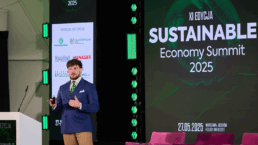
Interzero team-building trip
May is a time that, at Interzero, marks the joint integration of our group companies. As every year, the entire Polish team from our offices in Warsaw, Krakow, Lodz and Katowice went to relax and integrate in nature. This year's integration took place in Warka, an hour away from Warsaw, in the charming Sielanka Hotel on the banks of the Pilica River. The omnipresent greenery definitely helped us to relax.
The meeting started with a short presentation by the Board of Directors, summarising the main achievements and goals of each department. This was followed by a social game in the form of themed tables. Various topics were discussed, such as favourite books and films, sports, daily habits, as well as issues related to Polish cuisine and regional dialect. The discussions lasted an hour and a half and the participants were actively involved in the conversations. Even after the meeting, discussions on the proposed topics could be heard continuing in the corridors of the office.
After lunch, the second part of the integration activity took place, which was painting together. Each participant was given a cut-out of a larger painting in which our logo and the values that guide us in our daily work were inscribed. This was a great opportunity to show off a more creative side to the others, as well as an unexpected collaboration - those painting within the same puzzle eagerly exchanged self-mixed colours or good advice. The result of this fun are four unique paintings, which will soon be hanging on the walls of our Polish offices.
The culmination of the day was the evening party - for the first time, we decided to take the form of a costume party and invited participants to the Wild West. The creativity of our employees exceeded our wildest expectations. From classic cowboys and cowgirls to sheriffs and fugitives, the costumes perfectly reflected the spirit of the event. This is just further proof of how much ingenuity and positive energy our employees possess. A definite motivation was the competition for the best disguise - during the evening, employees were able to vote for their favourite. Among the most creative were the girls from the Administration Team in a group costume - although they did not win first place, they stole everyone's hearts with their pink hats and tulle skirts! Additional attractions included a shooting stand, where visitors could try their hand at shooting both short and long guns, and an electric bull - the record-holder managed to stay in the saddle for more than 46 seconds!
We started the morning of the second day with an invigorating outdoor yoga - a session for the body and a calm head. This was the final point of the trip - after breakfast together, we headed back on the road to return to our duties the following week with renewed energy.
Thank you for such a large attendance and, above all, Patrycja Seweryn and Aleksandra Leśniak for organising the entire event - thanks to your commitment and great ideas, we will long remember this trip and look forward to the next one!
The dangers of ultra fast fashion and waste-conscious education, or new episodes of Eco without the corners
In the latest episodes of Eco without a corner, we talked about the history of waste segregation and the challenges and threats posed by the modern textile industry.
Agnieszka Oleksyn-Wajda, Ph.D., analysed the phenomenon of ultra fast fashion and presented a series of policies and regulations that will help to stop this practice and significantly reduce the amount of textile waste with which our planet is currently flooded.
Meanwhile, together with Slawomir Starościak, an environmental practitioner with more than 30 years of experience, we leaned into the history of waste segregation in Poland from its very beginnings and discussed what impact key reforms (the new ROP model and the deposit system) as well as new technologies will have on separate collection.
Packaging tailored to the requirements of PPWR - thanks to Interzero and "Made for Recycling"
Focus on sustainable design: the new EU packaging regulation sets high requirements for packaging recycling. Interzero explains how they can actually be sorted and recycled using its research-based 'Made for Recycling' packaging analysis.
20 out of a possible 20 points: with this result, Gualapack's 'Pouch 5' is a true recycling champion. The leading supplier of squeeze pouches has already had its packaging evaluated several times according to the Made for Recycling" analysis standard, thus obtaining important information on sustainable design: "With Pouch 5, we have developed the first stand-up pouch with a spout made of a single material - polypropylene - that is highly recyclable." - says Lorenzo Sacchi, head of sustainability at Italian company Gualapack S.p.A.. "Interzero's expertise has been, and continues to be, essential to us when testing recyclability."
Recyclability confirmed by seal and mark
Sustainable packaging has long since ceased to be merely an image factor. According to the European Commission, recyclability will soon be the deciding factor for packaging in the market. PPWR keyword: The new EU packaging regulation states that all packaging must be recyclable from 2030. "With Made for Recycling, we support our customers in determining the actual recyclability of their packaging, optimizing it when necessary and developing new, future-proof solutions." - says Frank Kurrat, Managing Director of the Interzero Recycling Alliance. "In this way, companies can also differentiate their packaging from their competitors in the long term."
An important argument in favour of Gualapack: unlike many other environmental claims, the 'Made for Recycling' label is based on clearly defined, scientific facts. The international standard for the recyclability of packaging is based on an assessment methodology developed by Interzero in cooperation with the bifa Umweltinstitut and confirmed by the Fraunhofer Institute for Process Engineering and Packaging IVV. Packaging is analysed at the Interzero Plastics Innovation competence centre in Slovenia - the first and so far only accredited research facility in the EU specialising in the development and analysis of recycled plastics. Specialists not only analyse the materials and design of packaging, but also assess the practical sorting and recycling infrastructure, which can vary considerably from country to country.

Monomaterial has an advantage
For Gualapack, the commitment to recycling has undoubtedly paid off. In 2021, the single-ply PP bag won the Best Packaging Award in Italy and is now used by major brands such as Nestlé and Kraft Heinz. "Pouch 5 is now our flagship product and accounts for about a third of our flexible packaging sales." - says Lorenzo Sacchi. In terms of quality, the single-plastic packaging is not inferior to the standard versions. They can be sterilised and pasteurised, making them suitable for yoghurt or baby food packaging, for example, and the outer layer can be easily printed with a branding. A distinct advantage of the single-plastic version is that, from production to recycling, it emits around 40 per cent fewer greenhouse gases than a standard bag - an added incentive for companies looking to reduce their carbon footprint.
Interzero Waste Platform with mobile app. Introducing Interzero OneApp Polska
After the digital revolution in waste management, the time has come for a mobile revolution - from now on, you can have the most important functions of our bestselling Interzero Waste Platform on your smartphone! The new Interzero OneApp Polska mobile app will allow you to conveniently order waste collections, check the calendar of scheduled services and monitor the entire waste logistics of your company.
Interzero OneApp Poland - managing collections has never been easier!
Are you walking around the yard and see a full container? Do you have unusual waste and want to price it based on a photo? Or do you need to quickly check the dates of your ordered waste transports? Reach into your pocket - the solution to all these problems is in your smartphone!
Interzero OneApp Poland is first mobile application to comprehensively manage waste collection from anywhere and without having to boot up your computer. We have included all the most frequently used functions of our innovative digital tool, the Interzero Waste Platform, which is used by hundreds of satisfied customers every day.
From the Interzero OneApp Poland:
- order waste collection of his company,
- view the schedule logistics services,
- check the list of completed collections and details of each service,
- you will inform us of excess quantities of waste to be collected by the next shipment,
- conveniently report a lack of reception
- you send us a text message and attach to it photos or files.
The Interzero One App mobile app is synchronised with the web version of the Interzero Waste Platform. This ensures that all information on collection services is kept up to date and made available to all accounts assigned to your company. So you are free to use the service in your browser or in the app - your comfort is our priority!
Just as Uber revolutionised passenger transport, the Interzero OneApp Poland will revolutionise your company's waste management. Our app is a mobile waste management centre that you can always carry with you!
Thanks to Interzero OneApp Poland Have your waste collected in just a few seconds! You don't have to call, email or endlessly agree on details -. All you need to do is select the type of service and enter the weight of your waste. We will take care of the rest! This ordering scheme was already present in the Interzero Waste Platform. We have now transferred it to the mobile version so that you can notify us of your collection needs even more quickly and conveniently.
The Interzero OneApp Polska smartphone app allows you to order collection services on request and additional services. From the main menu, you can also inform us about additional waste to be collected, check the list of services in progress and report a missed collection.
All plans under control with the pick-up calendar in Interzero OneApp Polska
Efficient management requires good planning, which in turn cannot do without a calendar. Thanks to the Interzero OneApp You will have a calendar of waste logistics services at your fingertips at all times. You don't even need to complete it - all notified and scheduled receptions will automatically appear in the appropriate places. You will never forget an appointment again!
From the collection calendar, you can check not only the dates of completed and future services, but also the collection codes and the types and quantities of containers to be collected. All changes to the schedule and service areas update in real time, ensuring full transparency even when several users are using the app or the web-based version of the service. Clear colour coding you can easily distinguish between scheduled, call, additional and municipal services.
The Interzero OneApp Poland mobile app is available for our customers using the Interzero Waste Platform. If you would like to try it out at your company, please contact your account manager at Interzero. You can log in to it using your login and password from the traditional version of the website.

Interzero Waste Platform - what does the digital revolution in waste management look like?
The Interzero OneApp Polska mobile app is a functional and highly practical addition to the Interzero Waste Platform (POI) - our pioneering digital tool for comprehensive waste management within a company. This unique the system enables all waste management tasks to be carried out in one centralised location!
Using the web-based version of the Interzero Waste Platform you will perform the same tasks available in the app and much more:
- you automate the keeping of waste records in BDO,
- prepare, revise and approve Waste Transfer Notes,
- generate quantitative, qualitative and cost reports,
- you will track the costs of all waste management and the proceeds from the sale of raw materials,
- collect all environmental documentation in a digital repository,
- create a digital database of partners and subcontractors,
- you give your employees access levels that correspond to their tasks.
Interzero waste platform is fully integrated into the BDO system - saves all data in real time and immediately updates it in the Database. Logging into a government system thus becomes unnecessary - from now on you will manage your waste from anywhere and with the help of just one intuitive tool!
What's new at Interzero? Check out the April summary
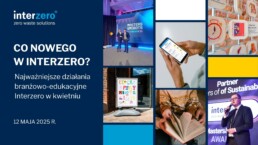
What's new at Interzero? Check out the April summary
What happened at Interzero in April? Read a summary of our speeches, industry activities and education!
The ministerial ROP proposal and the waste industry - a summary of industry activities
The latest ROP (extended producer responsibility) proposal by the Ministry of Climate and Environment, the introduction of a deposit system and changes in EU legislation have all influenced intensive activities in the waste management sector. For this reason Interzero experts actively engage with the media to make our position known on the proposed changes and systems. It is also an opportunity to participate in debates and discussions with representatives of various industries and government administrations. We encourage you to find out more about the activities undertaken by Interzero in April.
Interzero in the media about the ROP
Heated discussion continues in relation to the Ministry of Climate and Environment's proposal for a new ROP system for packaging. The position presented brings the Extended Producers' Liability to para-taxThis is why the IOC proposal is criticised by business. Interzero, as an experienced player in the market, takes an active part in the discussion. The temperature of the public debate indicates differentiated positions of different stakeholders towards the new draft ROP. Further consultations are needed to develop optimal solutions. Interzero cooperates with chambers of commerce and business associations, prepares letters addressed to the Ministry and is active at meetings, debates or conferences.
Pawel Sosnowski, Plenipotentiary of the Management Board for Environmental Regulation at Interzero, during a debate on ROP organised by the editors of the Rzeczpospolita daily newspaper, stressed that the assumptions of the Polish model for these regulations are at odds with the intention clearly implied in EU law.
- European regulations on waste management systems, both the Waste Directive and the PPWR, clearly indicate the need for producer responsibility organisations.
Below is the entire debate:
Przemyslaw Kuna, Managing Director at Interzero in the discussion on ROP in the WPROST debate, showed the great openness of the entire industry towards the evolving changes in waste management.
- In the words of Deputy Climate Minister Anita Sowinska, we can hear that her big concern is the recycling documents (DPR). No problem. Let's abolish DPRs, let's do something else. We can replace them with contracts.
He also spoke to Politics about the important role of Recovery Organisations and the proposal for a new model Pawel Lesiak, Executive Vice President at Interzero:
- The new ROP will introduce another important and emotionally charged change. Recovery organisations now have an important role.[...] They are representatives of entrepreneurs placing packaging on the market. Their main task is to achieve the recycling levels required of them by entrepreneurs. Packaging recovery organisations, in cooperation with the waste management industry, ensure that the right types of packaging waste are collected, often pre-processed (sorting, refining) and then finally recycled. Furthermore, they also conduct environmental audits and are involved in environmental education that strengthens public awareness of the correct way to manage waste, starting with household segregation.
Bail system to start in autumn - what is the mood of Poles? Statement by Paweł Lesiak for Newseria
As early as 1 October, the bail system is to be launched in Poland, which, despite the positive attitude of the public, also raises some concerns and doubts. As the Interzero report shows, most Poles are aware of the upcoming changes, but many still do not understand how the system works.
In a statement to the Newseria portal, Pawel Lesiak pointed out that older generations show more interest in bailing than younger generations, and that the key will be the attitude of consumers and their patience in the initial stages:
- We must not give in to our own frustration, as the system will be implemented gradually at first, and not all bottles will be in the deposit cycle immediately.
He also predicts that the new system could be a convenience for residents, allowing them to dispose of packaging more quickly during their daily shopping. He also reminds us that although the system will formally start in 2025, its full functioning and the widespread availability of collection points will not really take place until 2026. It is therefore advisable to treat the first months as a test phase and give yourself and the system time to adapt.
Read the full article here.
Digital revolution in the world of waste. Interzero at Masters&Robots with award for Interzero Waste Platform
In March our Interzero Waste Platform (POI) won third place in the prestigious competition Masters&Robots, confirming our position as a leader in digital waste management. POI is a unique online system that enables comprehensive waste management and environmental documentation, reducing costs and automating waste records in BDO.
Waste management has never been so simple - Platform customers gain even more comfort and freedom through our new Interzero One mobile app. The app allows quick reporting of waste collections and access to up-to-date schedules - all in one place. Thanks to full synchronisation with the web platform, users have a real-time overview of current and planned services, the ability to report excess waste and access to the collection calendar. In addition, a direct contact function with the custodian and the ability to attach photos and files improve communication and eliminate inaccuracies.
As he emphasises Aleksandra Mikiel, Director of Digital Solutions and Transformation at Interzero:
- Our aim is not only to make waste management easier, but also to create a more sustainable and efficient system that benefits all users. With Interzero OneApp, our customers can now report waste collections even more easily and quickly and benefit from full synchronisation with the web platform. This is a step towards a more integrated and user-friendly system that addresses their waste management needs and challenges.
We encourage you to use our solutions and keep an eye out for more news!
New developments in environmental and waste regulations for 2025. - free Interzero webinar
The new year brings further changes to environmental legislation - new obligations extend to all entrepreneurs registered with BDO, in addition to changes to construction and textile waste regulations. In parallel, ministerial work on shaping the law implementing the ROP for packaging waste producers is well advanced. In the face of so many changes, a meeting was held on 10 April Interzero's free webinar 'New developments in environmental and waste regulations for 2025', divided into two thematic blocks, in which Interzero experts - Pawel Sosnowski, Plenipotentiary of the Management Board for Environmental Regulation, and Wojciech Przybycin, Environmental Expert - explained what the changes entailed and answered questions from participants about their own activities.
Both parts of the webinar can be viewed on the platform of the Interzero Academy:
- ROP - what's all the fuss about? Summary of the current status of the work on Extended Producer Responsibility and possible future scenarios
- Changes to construction and textile waste regulations and changes to BDO from 2025 - everything you need to know
We encourage you to follow our calendar of eventsso that you do not miss out on upcoming training courses.
Educational activities - listen to new episodes of the podcast Eco without the corners
Read about the key educational activities we undertook in April
Interzero 2025 Environmental Conference - last places!
In less than a month's time the 2025 Environment Conference will be launched - don't miss out on registration!
Why take part?
- We will touch on the most important environmental topics for businesses - including the new ROP, PPWR, the implementation of the deposit system or the new rules for textile segregation.
- Speakers include well-known web developers, experts from leading brands (Allegro, mBank, PwC), organisations (GS1, Lewiatan Confederation, Responsible Business Forum) and Interzero specialists. Full agenda available here.
- You have a unique opportunity to establish valuable business relationships and learn about the latest trends in sustainable business development.
We see you already 3 June at Warszawianka Hotel near Serock - register!
Eco without corners - recordings with Dominik Dobrowolski and articles
In the first part "Clean Oder, clean Vistula - is it possible?". We went back to the nature activities of the 1980s, talked about climate change, the viability of ecology and, above all, about rivers, of which Dominik is a lover and expert. What should change in our daily functioning and system to make rivers cleaner?
In the second episode "Extended producer and ... consumer liability?" we touched on system solutions that can support environmental protection. The broad view represented by Dominik shows Extended Producer Responsibility or the deposit system as minor elements that contribute to one key objective. On the road to a clean environment, many stakeholders come together. What is their responsibility?
Earth Day - we are an Ecozgrai partner
This year we celebrated Earth Day for the 55th time! The history of this holiday is not perfect. We wrote about The Indian Who Cried, a campaign using the image of native North Americans as a symbol of reunion with nature and respect for our planet, last year on the Eco-friendly without the frills - It is worth recalling this story.
We also have positive news - Interzero's education campaigns, Eco-friendly without the frills i EcoPak, are Children's book partner "Eco-game" published by Skrzat. In this publication we meet a group of school friends who, as part of the nature club and their own adventures, solve various ecological puzzles, learn about waste segregation and fight for cleaner air. Highly recommended!

The cover of the book 'Ekozgraja'. photo: Wydawnictwo Skrzat
EcoExperimentarium continues on tour! See you in Lodz
EcoExperimentarium on tour again - now we see you in Lodz!
We are delighted to announce that the EcoExperimentarium - the nationally renowned environmental exhibition for children and adults - has arrived in Lodz! Until 25 May 2025, it can be visited in the Fusion space, 6a Milionowa Street. The exhibition is available free of charge to anyone interested.
This unique educational event promotes green habits at home in an accessible and engaging way. Children from the age of 5 and adults can learn together how to save water, energy and reduce waste.
Interzero is a partner of the EcoExperimentarium exhibition
As partner EcoExperimentarium, the company Interzero actively supports environmental education - especially in the kitchen area, where visitors will learn about the importance of correct waste segregation and selective collection right at the source, i.e. in our homes.
- We believe that well-designed environmental education shapes social attitudes from an early age - says Katarzyna Kacz, Project Manager CSR and Environmental Education at Interzero.
What will you find at the exhibition?
As part of the interactive exhibition, visitors can:
-
"catch" energy vampires in the living room,
-
see how much water can be saved in the bathroom,
-
learn segregate waste in the kitchen,
-
rethink consumption and minimalism in the bedroom.
This is a great opportunity to learn about ecology through play -. both individually and in groups.
Practical information - when and where?
Location: Fuzja, 6a Milionowa Street, Łódź
Deadline: until 25 May 2025.
Opening hours:
-
Mon-Fri: 9 a.m. to 2 p.m. (for schools and kindergartens, online enrolment)
-
Sunday: 12:00-18:00
Admission: free




